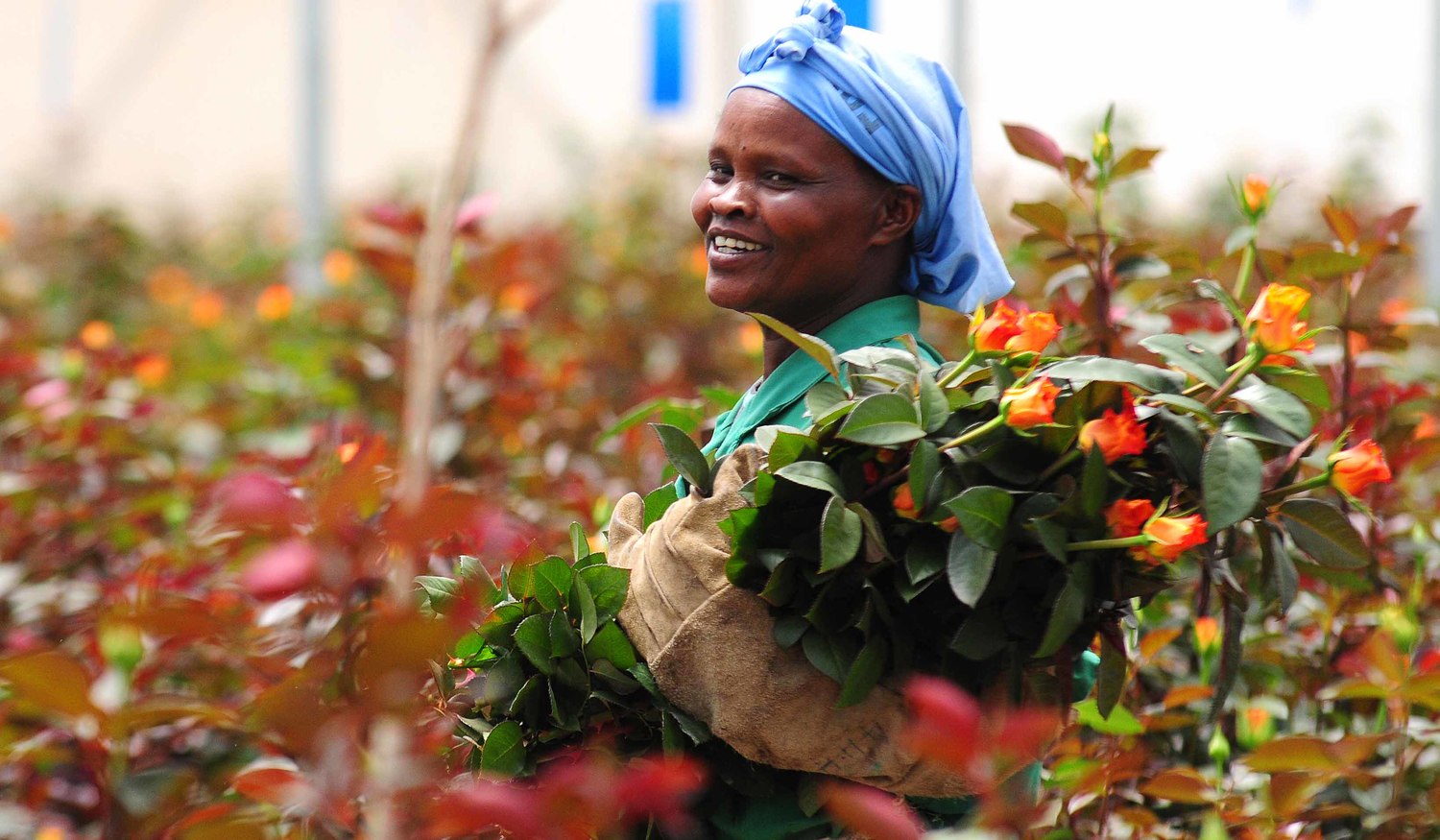The soil in the Kenyan Rift Valley is known for being particularly fertile. The rift owes this fertility to two tectonic plates that split many million years ago and left behind plenty of rich volcanic rock. Lake Naivasha is the highest lake in this vast trench. The first flower farm settled on its shore in 1982 (Deutsche Welle, 2017). Not only the soil and the fresh water but also the proximity to the equator, the sunny days and the cool nights provide an optimal climate in which flowers grow.
[nz_row][nz_col width=”2″]
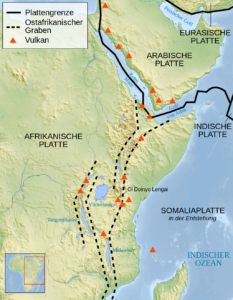
[/nz_col][nz_col width=”2″]
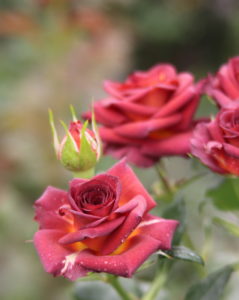
[/nz_col][/nz_row]
Kenyan Flowers: A growing Market
Today there are about 220 flower farms in Kenya, about 70 of them are located near Lake Naivasha. Flowers have become an important economic sector and, along with tea, one of the country’s key exports. After the Netherlands, Colombia and Ecuador, Kenya is the fourth largest exporter of flowers in the world: every third flower sold in Germany comes from this East African country.
The flower business has flourished in Kenya, creating a lot of jobs as well as a new source of income for the population. “We employ more than 150,000 people directly,” says Clement Kulezi of the Kenya Flower Council, “and probably around half a million people in the supply sector” (ZDF, 2019).
Thriving industries are good for a country’s economic development. Yet, when industries thrive at the expense of local ecosystems and the environment this poses a long-term threat to all stakeholders. It is therefore crucial that the budding flower market is growing not just in terms of quantity but also in terms of quality.
Lake Naivasha and the Flower Boom
A few years ago, Lake Naivasha was in danger of nearly drying up. Many farms fed the lake water directly into their greenhouses. After satisfying their high water needs, the water – now polluted with nitrate and pesticides – was pumped back into the lake. The impact on the ecosystems in and around the lake was great: both flora and fauna suffered from the poor water quality and sinking water levels.
Since then, most farms have undertaken efforts to reduce their strain on resources and have switched to closed water cycles. Doing so has allowed water levels to rise again and the situation has improved significantly. However, there is still a lot of room for improvement when it comes to environmental protection.
Fertile Soil for Sustainable Flowers
The flower farm Equinox Horticulture and the flower breeder Interplant Roses play a pioneering role here. A low ecological footprint and happy employees are their recipe for success. When the two companies switched to solar power last summer with the support of Ariya Finergy, this was just one of many steps they took towards sustainability. Equinox and Interplant have been committed to both people and the planet for years.
An Eye for the Environment
Chemicals
In order to minimise their impact on the environment, both farms are committed to pursuing the greenest and most environmentally friendly approach possible. In order to do so, they have adopted the idea of Integrated Pest Management (IPM) and Integrated Crop Management (ICM). As such, pesticides are only used during the stages of growth, when the plants are at their most vulnerable and susceptible to disease and pest. Outside of this period, they use the most environmentally friendly biological weapon to fight off pests: insects. These biological agents predate on the harmful pests that affect the flowers, significantly reducing the need for chemicals.
Through this synergetic combination of chemical and natural agents, the two companies comply with all EU regulations on chemicals and pesticides. In particular, they avoid substances that are particularly harmful to pollinators like the bumblebee. Moreover, they avoid chemicals that will linger for a prolonged length of time, ensuring no residue enters the food chain. They also exclude chemicals that can affect the aquatic life, the ozone layer or mammalian life.
[nz_row][nz_col width=”3″]
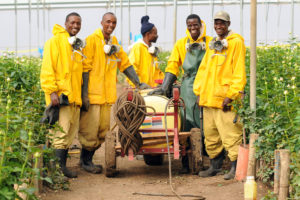
[/nz_col][nz_col width=”3″]
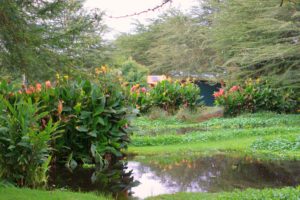
[/nz_col][nz_col width=”3″]
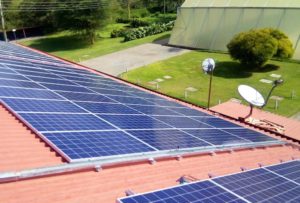
[/nz_col][/nz_row]
Image Source: Equinox Horticulture Ltd (left) and Interplant Roses B.V. (centre and right)
Water Management
For Interplant and Equinox, saving and recycling water is part of their ideology: A good water management system is not only ecologically responsible but also economically advantageous.
At Interplant, a reverse osmosis machine cleans used water through multimedia filters and UV sterilisation. This closed irrigation system ensures that 100 % of the water is reused. Any water that is not absorbed by the flowers, it is simply fed back into the machine and recycled.
Any other wastewater, for example, from the cleaning of the packing house or office, ends up directly in the farm’s own wetland. The wetland not only purifies the water and releases it back into the environment, but also serves as a sanctuary for many bird and fish species.
Equinox does things very similarly. In addition to a closed water circuit, the farm has also installed a water collection system to allow rainwater to flow into the irrigation system.
Sustainability
As members of the Kenya Flower Council, both farms follow the Global GAP and are rigorously audited as a result. External independent auditors regularly visit the farms to verify that they comply with strict environmental and chemical regulations and that their health and social policies meet the highest standards.
In addition, Equinox has been MPS certified since 2013. MPS is a worldwide standard in the horticulture sector that uses a rating system to indicate how environmentally friendly a company’s production processes are. Equinox has received the highest rating – MPS-A – for environmental responsibility in agriculture, as well as the MPS-SQ label for fair working conditions. In the industry, an MPS certificate has the same status as the FairTrade label and is recognised and valued by European traders and buyers.
Fair Flowers and Happy Employees
Interplant has around 80 employees, Equinox 500. The physical and mental wellbeing of their employees lies entirely in their hands. Next to fair wages, additional benefits are important in order to create a healthy and positive work environment. For example, Equinox employees have access to a company nurse and clinic. Regular training and education is also provided. Equinox opened a canteen in 2015 which serves Equinox employees subsidised meals and drinks every day.
Interplant employees enjoy similar benefits. To give you a direct insight into this work environment, we spoke with David, Loise and John, who work at Interplant Roses. They kindly let us share their story.
David Kamau Kamotho
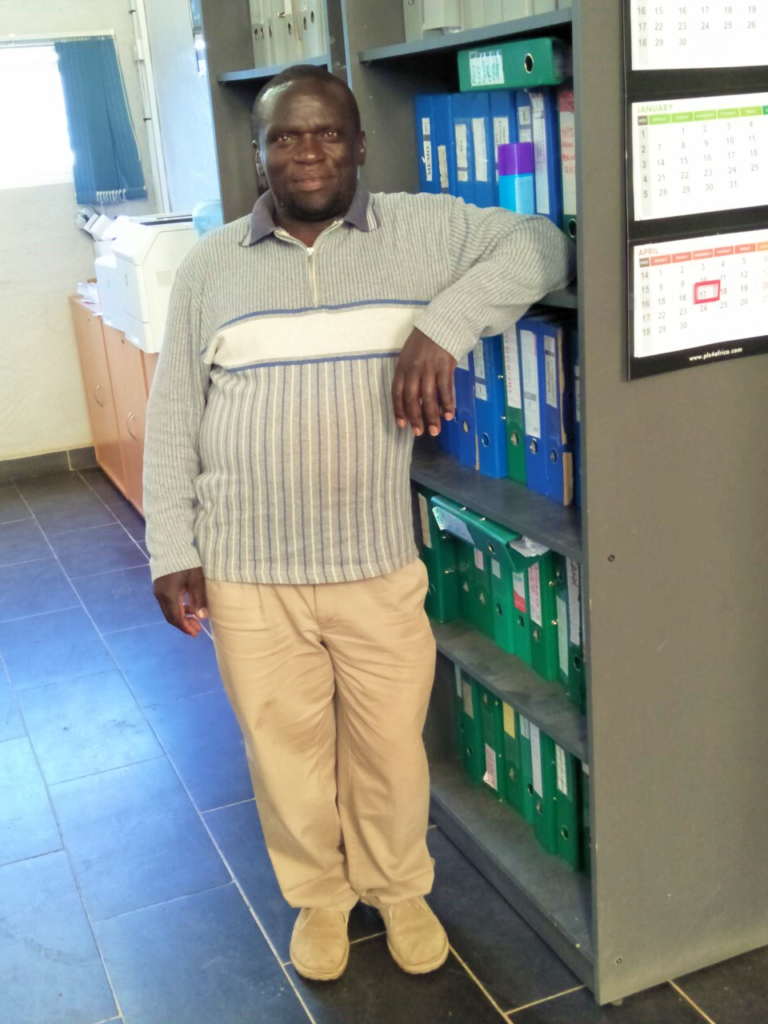 Where are you from? I am originally from Nyandarua County, but have re-settled in Laikipia County where I now own a small piece of land and a house.
Where are you from? I am originally from Nyandarua County, but have re-settled in Laikipia County where I now own a small piece of land and a house.
Do you have children? Yes.
What is your role at Equinox? I am the Sustainability Manager and Compliance Officer. I am also the Health & Safety Officer and the Energy Manager.
What is an average working day like for you? I start the day by updating the solar panel logbook. Then I review all matters of compliance ranging from environmental management to health and safety as well as any other related compliance concern.
How has working at Equinox had a positive impact on your life – and that of your family? I have grown both professionally and economically. With my income from Equinox I have been able to build a house for my family about 6 kilometres from the farm.
What do you like most about working at Equinox? The peace of mind and good relationships with my senior and junior colleagues.
Bonus question: What is your favorite flower and why? I like Pink Journey the most, the colour is brilliant and gives me the impression of a brighter future.
Loise Wagaki Ngunjiri
 Where are you from? I come from Nanyuki.
Where are you from? I come from Nanyuki.
Do you have children? Yes, two sons.
What is your role in Equinox? I am the HR manager.
What does an average working day look like for you? I check attendance management and reporting every day. My task is to get a feel for the atmosphere in the workplace and take care of the general well-being of the employees. I also oversee the recruitment and training of new staff and follow-up on disciplinary matters.
How has working at Equinox had a positive impact on your life – and that of your family? On a personal level, I have developed myself career-wise and socially. I am able to provide for my family, meet their needs and educate my sons.
What do you like best about working at Equinox? There is a lot of room to grow and the flexible working hours help create a great work-life-balance.
Bonus question: What is your favorite flower and why? The Maire Claire! Its colour brightens the room.
John Ngugi
 Where are you from? I was born in Muranga County and later settled in Nanyuki Laikipia County.
Where are you from? I was born in Muranga County and later settled in Nanyuki Laikipia County.
Do you have children? Yes, two girls aged 9 and 4.
What is your role at Equinox? As assistant General Manager I coordinate teams in different departments and try to create synergies between them in order to get the best out of the teams. I help them grow and, moreover, I ensure that they enjoy what they do.
What does an average working day look like for you? I spend most of the morning on the field. There I engage with the teams and mainly oversee the harvesting and spraying. In the afternoons I focus on the postharvest and irrigation.
How has working at Equinox had a positive impact on your life – and that of your family? The experience and training I gained at Equinox has moulded me into a leader. This has given me the opportunity to lead successful teams and at the same time provide a decent livelihood for my family and myself.
What do you like most about working at Equinox? The great potential within the teams. I’m looking forward to further tapping into this potential!
Bonus question: What is your favourite flower and why? Pink Journey. I was involved in the selection process. At first, we only had 100 plants, then 400, and now the flower has spread over two hectares. It’s very satisfying to see it growing so well! I am proud of that.

